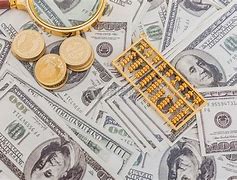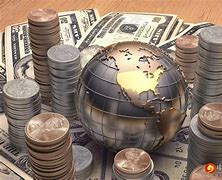Foreign exchange trading: It is to buy one currency in a pair of currency pairs and sell another currency at the same time. Forex is traded in currency pairs, such as the Euro/U.S. dollar (EUR/USD) or the U.S. dollar/Japanese yen (USD/JPY).
The foreign exchange market, also known as the "Forex" or "FX" market, is the largest financial market in the world, with an average daily turnover of more than 5 trillion US dollars in funds - equivalent to more than three times the sum of all securities market transactions in the United States .
The concept of trading foreign exchange is very simple: a commodity that can be exchanged for other currencies. By buying and selling currencies, forex traders earn the price difference through fluctuations in exchange rates. The great charm of the foreign exchange market is that transaction costs are very low. This means that transactions can be completed in an extremely short period of time, as short as a few seconds, or for longer periods of time.
Why trade Forex?
Circulation
The foreign exchange market is the financial market with the largest circulation in the world, and the transaction cost is lower than that of buying and selling other financial products. Due to the depth of the foreign exchange market, compared to other financial markets, there is almost no slippage. Under normal market conditions and sizes, your positions in the most liquid currency pairs will not experience slippage.
24-hour global market
Foreign exchange transactions are not carried out in a central exchange or a fixed place, but outside the trading place (off-site) through electronic trading systems or telephones, from Sunday night to Friday night (Australian time) 24 hours a day without interruption trade. 24-hour trading means that there is no possibility of trading gaps, and it allows investors to make timely adjustments to political, economic, technical and fundamental factors without waiting for the market to open before trading.
Enter the foreign exchange market
The rapid development of the Internet allows retail customers to enter the foreign exchange market and conduct transactions within a thousandth of a second through online traders. Leveraged foreign exchange trading has greatly increased the trading volume of retail customers. It is estimated that the daily trade volume of retail foreign exchange customers has risen from 10 billion in 2000 to more than 200 billion in 20124.
leveraged trading
Foreign exchange trading is a margin trading (leveraged trading) product, you only need to pay a small part of the contract value as the initial margin to trade. This means that the return on investment and the investment gain or loss are higher than traditional cash transactions.
low transaction costs
Most foreign exchange dealers do not charge commissions or fees for foreign exchange transactions, but profit from the transaction spread, which is the difference in the price at which customers buy (bid price) or sell (ask price). Due to the large circulation and 24-hour trading, the spread of the currency combination is small, which means that the transaction cost is low. In addition, other transaction costs of foreign exchange transactions are also lower than those of other financial markets, such as the initial margin required for transactions is small; and the financing ratio, that is, the cost of borrowing funds for overnight transactions is also low.
can buy or sell
Clients tend to take a positive or negative view of how one currency will affect another, and free-floating currencies have no sell (short) restrictions.
market volatility
The exchange rate will continue to fluctuate and adjust under the influence of different political, economic, technical and fundamental factors. Its volatility makes foreign exchange transactions arouse the interest of investors, because the price will change rapidly due to multiple factors, which will create more good trading opportunities.
Foreign exchange trading: It is to buy one currency in a pair of currency pairs and sell another currency at the same time. Forex is traded in currency pairs such as the Euro/U.S. dollar (EUR/USD) or the U.S. dollar/Japanese yen (USD/JPY).
The foreign exchange market also known as the "Forex" or "FX" market is the largest financial market in the world with an average daily turnover of more than 5 trillion US dollars in funds - equivalent to more than three times the sum of all securities market transactions in the United States .
The concept of trading foreign exchange is very simple: a commodity that can be exchanged for other currencies. By buying and selling currencies forex traders earn the price difference through fluctuations in exchange rates. The great charm of the foreign exchange market is that transaction costs are very low. This means that transactions can be completed in an extremely short period of time as short as a few seconds or for longer periods of time.
Why trade Forex?
Circulation
The foreign exchange market is the financial market with the largest circulation in the world and the transaction cost is lower than that of buying and selling other financial products. Due to the depth of the foreign exchange market compared to other financial markets there is almost no slippage. Under normal market conditions and sizes your positions in the most liquid currency pairs will not experience slippage.
24-hour global market
Foreign exchange transactions are not carried out in a central exchange or a fixed place but outside the trading place (off-site) through electronic trading systems or telephones from Sunday night to Friday night (Australian time) 24 hours a day without interruption trade. 24-hour trading means that there is no possibility of trading gaps and it allows investors to make timely adjustments to political economic technical and fundamental factors without waiting for the market to open before trading.
Enter the foreign exchange market
The rapid development of the Internet allows retail customers to enter the foreign exchange market and conduct transactions within a thousandth of a second through online traders. Leveraged foreign exchange trading has greatly increased the trading volume of retail customers. It is estimated that the daily trade volume of retail foreign exchange customers has risen from 10 billion in 2000 to more than 200 billion in 20124.
leveraged trading
Foreign exchange trading is a margin trading (leveraged trading) product you only need to pay a small part of the contract value as the initial margin to trade. This means that the return on investment and the investment gain or loss are higher than traditional cash transactions.
low transaction costs
Most foreign exchange dealers do not charge commissions or fees for foreign exchange transactions but profit from the transaction spread which is the difference in the price at which customers buy (bid price) or sell (ask price). Due to the large circulation and 24-hour trading the spread of the currency combination is small which means that the transaction cost is low. In addition other transaction costs of foreign exchange transactions are also lower than those of other financial markets such as the initial margin required for transactions is small; and the financing ratio that is the cost of borrowing funds for overnight transactions is also low.
can buy or sell
Clients tend to take a positive or negative view of how one currency will affect another and free-floating currencies have no sell (short) restrictions.
market volatility
The exchange rate will continue to fluctuate and adjust under the influence of different political economic technical and fundamental factors. Its volatility makes foreign exchange transactions arouse the interest of investors because the price will change rapidly due to multiple factors which will create more good trading opportunities.















